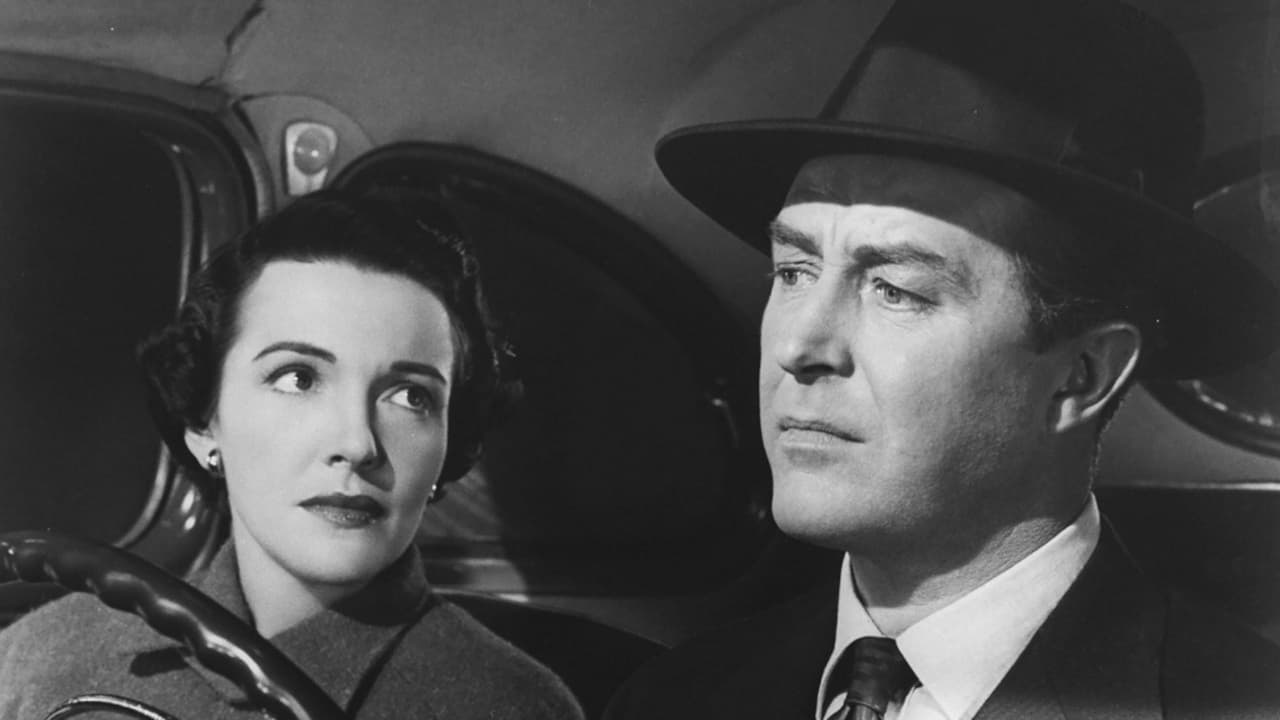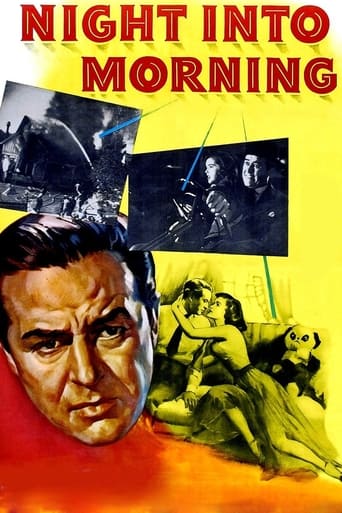

Wow, what a surprise this movie was for me!! I did it mainly to see another example of Nancy Davis's acting ability. Until now, I had only seen her in fairly limited roles in The Next Voice You Hear... (1950) and It's A Big Country(1951). I was not only impressed with her totally natural acting but was pleasantly surprised by this movie itself. I had never heard of it before. Perhaps I have seen The Lost Weekend (1945) too many times; but with Night Into Morning, I felt Milland gave a better performance as a depressed alcoholic than he did in his Oscar- winning performance in The Lost Weekend.The movie presents the story about a Berkley University English professor (Ray Milland) whose life is turned upside down when he looses his entire family because his basement furnace blows up. Suddenly, without his wife (Rosemary DeCamp) and son, he is left with a totally empty life. He copes with his emptiness by immersing himself in his work and in the bottle. Although his fellow workers and friends try to help him get his life back on track, only his fellow professor's fiancée (Nancy Davis) understands his pain, since she had been a WW II widow before remarrying the professor (John Hodiak). Her hyper-understanding of Ray Milland's character threatens her new marriage, which gives the movie yet another dimension.Other good performances in the movie are turned in by Lewis Stone, as the English Department Head, and Jean Hagen as his neighbor. Lewis Stone was a staple in the Silents early 'Talkies,' but seemed to get even better with age. Jean Hagen is the familiar character actress with the funny voice from Singin' in the Rain (1952), Adam's Rib (1949), and The Asphalt Jungle (1950).
... View MoreWhen I first saw this with my wife, she said that Dore Shary liked to produce films to enlighten. This one should be released immediately on commercial video. A college professor (Ray Milland) loses his wife (Rosemary DeCamp) and son in a fire.He gradually starts to come apart at the seams. His actions: insomnia, drinking, mood swings, are realistically shown. Along the way, we see Nancy Davis' character, and learn that she went through the same thing. This movie contains so much, that one must watch it many times to absorb it all. How Miss Davis' character moves from attempted suicide to happiness is a story in itself.Her fiancée, as he described himself "A thick-headed Swede" is handled perfectly. Just in time, the professor is saved from committing suicide. He then moves in with his friends. The movie ends with him telling his students to "go with God". There is no happy ending. The worst may be over, though there will be many rough times ahead. At least now our protagonist knows what he is facing.WHAT A MOVIE.
... View MoreRAY MILLAND is a troubled professor who seems to be wallowing in self-pity shortly after the death of his wife and son in a house fire. He begins to scare people with his brusque behavior, both in and out of the classroom. NANCY DAVIS and JOHN HODIAK are sympathetic friends who offer him loyal support--but nobody seems able to help Milland who seems to want to spend more time with the bottle than anything else.The self-pity angle goes on for too long to make Milland's character likable, although his acting is quietly underplayed and altogether believable. "I know you want to help me. Most people do, but you can't," he tells Davis who had to get over her own sense of loss in the past. Davis is full of platitudes and is almost too nice, but she too plays her role well, as does Hodiak.This goes on for the first hour and the main interest in the story is to see how and when Milland will snap out of it. Toward the end of the film he's still telling a waitress, "Find me a glass without a hole in the bottom." It takes a student athlete unable to pass one of Milland's exams that sets the plot on a final course wherein a driving accident lands him in jail and on probation. But Milland's change of heart enables him to give the flunking college student (JONATHAN COTT) another chance to pass, which he does, and he goes about setting in motion his final will, leaving his kid's bike to the boy's best friend. What happens after that, is quite predictable, but once again it's Nancy to the rescue.Honest telling of a troubling tale of a man attempting to solve his problems with alcohol. Nowhere as engaging or powerful as Milland's most famous film, THE LOST WEEKEND, but a modestly successful drama on its own merits.
... View MoreWell this is a little movie about human tragedy, and surprisingly, it´s almost free from sentimental cliches. But that doesn´t mean that it is very concrete in its conviction (after all it was made in the early 50´s)The main character is played by Ray Milland (I know nothing about this guy). He is an professor that one day loses his home and family. He hides the tragedy deep inside and sternly carries on with his work - at his friends concerns. But now the feelings gets too overwhelming and he starts drinking and becomes suicidal. But as the title says, this film has a happy ending.What make this pretty dull movie worth watching, is the great performance from Milland. He acts his roll with great dignity, and although his age, he is quite convincing in it (specially in the "attempted suicide scene") . He stands clearly miles away from the sentimental intellectual drunkard acting of likes such as Van Hefling or Van Johnson etc.
... View More